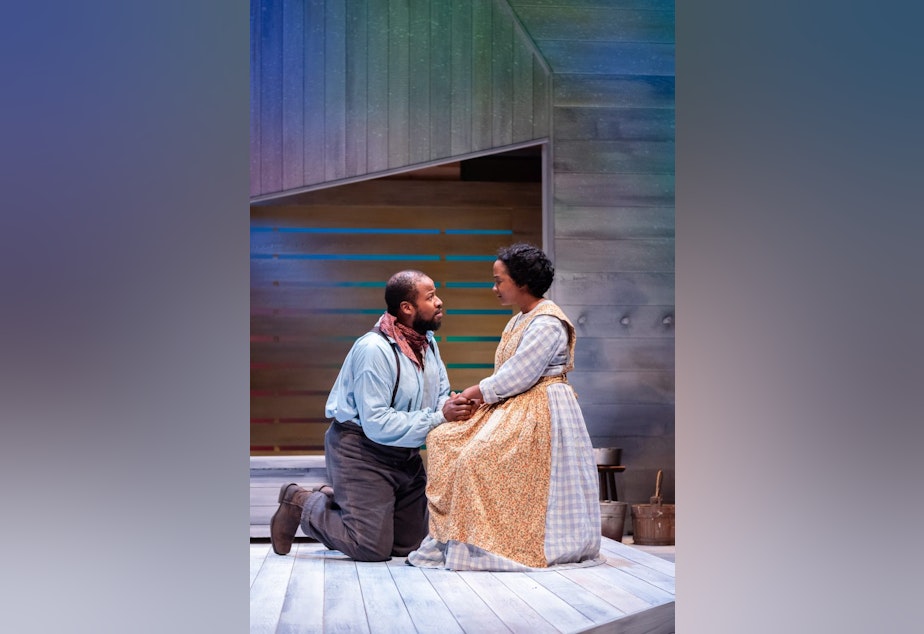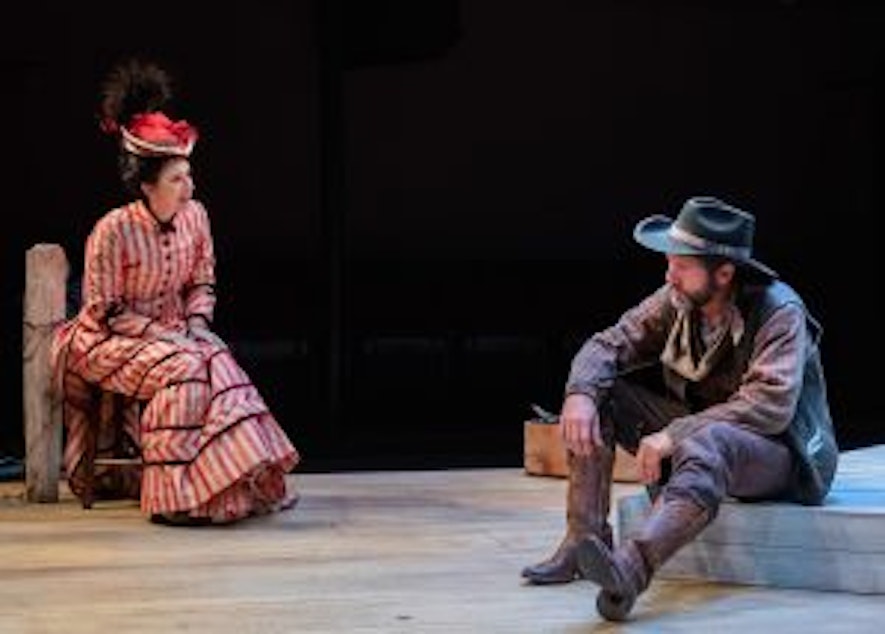'Last Drive to Dodge' gallops into Seattle with a tale of Black cowboys in the Old West

“Last Drive to Dodge” is an ambitious play penned by an up-and-coming playwright who is embarking on a nine-play cycle that bookends the legendary cycle of August Wilson. This grandiose idea made it hard to view this production without judging it in comparison with the work of perhaps the greatest Black playwright in the history of our country. Even so, I left the theater impressed by the work of Andrew Lee Creech, and convinced he is a playwright with a big future.
Everything about this production felt simple, from the pristine washed-wooden set by scenic designer Matthew Smucker, to the delicate stars placed upon the set by lighting director Brian Engel. But I’d argue that the standout choice on the production team is director Valerie Curtis-Newton, who brought this poetic and historical depiction of the Old West, 20 years after emancipation, to life.
Here’s What to Expect
This play is full of historical references that are impossible to miss. On its face, “Last Drive to Dodge” is a story about Prophet, a Black cowboy (Yusef Seevers), and his girlfriend Ro, a Black domestic worker (Dedra D. Woods), who work on the ranch of Bennett Bailey (Tim Gouran) in 1884 Texas. But underneath the plight of Prophet, who has big dreams of owning his own cattle and land, Creech weaves in historical events that highlight the changing times the characters are immersed in. We see the impact of the invention of barbed wire. We witness the changes that came with the privatization of cattle ranching as land was quickly being purchased and, for the first time, fenced off. We see how this physical division of land caused problems for ranchers who were used to allowing cattle to graze on open land and having direct access to sources of water.
But more than all of that, we learn about the people. That is the strength of Creech’s writing. I came into the theater expecting to side with Profit and Ro, but was pleasantly surprised to see a side of white southerners that I have read about, but never seen humanized in this way. Creech gave space for Bennett and his sister Millie (Jonelle Jordan) to let audiences explore the sentiments of poor white people and come to our own conclusions on how to view them.
There is a moment in act one, when Bennett unironically says to Prophet, “Work hard, dream big, and have a legacy.” Bennett believes in the bootstrap theory of America, and as the son of ranchers, and a hard worker himself, he truly believes that everything he has is earned. But what Bennett fails to see is that he is talking directly to a hard-working man with big dreams of building a legacy, who does not have the same level of access because he was born Black. Prophet has worked his whole life toward saving enough money to purchase land. Bennett, who is poor and low class by the standards of the day, claims to have worked for everything while ignoring the fact that he owns land passed down from his father. And he is speaking to a man whose father was a slave.
Sponsored
This dynamic between poor whites and Blacks persists throughout the play. Millie, a character who married for social status, but who has returned to the ranch after a failed marriage, has many interactions with Ro that caused audible reactions from the audience. One moment that dropped jaws throughout the crowd came when Millie, who is illiterate, is surprised to learn that Ro can read. This moment displayed that for Millie, even though she was poor, she was still white, and the idea of a Black woman like Ro being literate when she herself was not, was unthinkable.
One of the more illuminating moments came during a discussion between Millie and Ro on the Statue of Liberty. I learned from this interaction that the French donated the statue itself, but they did not pay for the base that it needed to be mounted on. Millie points out that they gave us a gift that also came with an expense. In discussion of said expense, the Civil War came up. Millie mentioned that poor whites, like the Baileys, were asked to fight in the “rich man’s war” and talked about how the Confederate soldiers seized food and supplies from them, and how Bennett was forced to fight in place of his father.
In Millie's eyes, poor whites had built this country, and she didn’t feel it was right to ask them to pay for statues. Of course, she is saying this to a woman who was a generation removed from slavery, who voiced a very different opinion of who built this country. These poignant exchanges dig into the truths of our nation and put two classes of people we often read about, but rarely see together, in front of audiences with dialogue that may be too poetic and overly intellectual for the time period of the production but are nonetheless thought provoking for audiences.

Here’s who it is for
Sponsored
Theater lovers! This is the artform at its best. A simple production, great writing, an experienced director able to work insightful dialogue into an artful experience, and an intimate set that allows the audience to fully connect with the characters. This production has only four actors, but each performer brought life and perspective into their characters, leaving audiences more informed than they were coming in, but still curious enough for further conversation. And maybe some, like myself, will end up doing some further reading.
My Recommendation
Go see this play. Tonight! You won’t be disappointed. This is not a musical, so there is a lot of talking without song or dance to break it up. The pacing is good, and the story moves along, but I do think the runtime is a little long. I mentioned the simple set, and it works for what this story wants to accomplish, but it does mean that there is not a lot of visual stimuli beyond the actors themselves. There are projections and elements with the lighting that happen, but this play is about the characters, and it works because each actor did such a great job embodying their role.
"Last Drive to Dodge," at Taproot Theatre until Oct. 21




